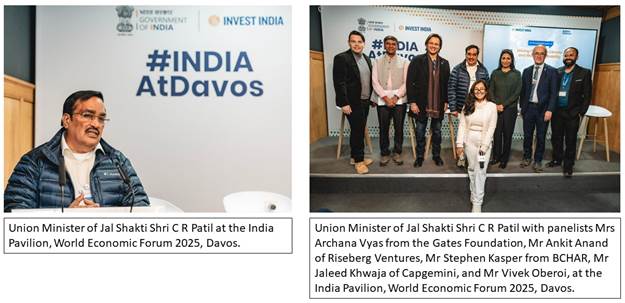Ministry of Jal Shakti
India's WASH Innovations Lead Global Discourse at World Economic Forum 2025
Union Cabinet minister of Jal Shakti, Shri C.R. Patil delivers keynote address
Posted On:
24 JAN 2025 3:29PM by PIB Delhi

The India Pavilion at World Economic Forum 2025 in Davos hosted a global discussion titled “India’s WASH Innovation: Driving Global Impact in Climate and Water Sustainability.” The high-profile session organised at the backdrop of showcasing best practices adopted by the mission, highlighted India's transformative achievements in water, sanitation, and hygiene (WASH), emphasizing their critical role in global climate resilience and sustainable development.
Shri C. R. Patil, Hon'ble Union Minister of Jal Shakti, delivered the keynote address, presenting India's journey in implementing the Swachh Bharat Mission (SBM) and Jal Jeevan Mission (JJM). These initiatives have been pivotal in improving sanitation coverage and providing safe drinking water to millions of rural households.
Shri C. R. Patil, Hon'ble Union Cabinet Minister of Jal Shakti stated, “This marks a significant milestone, demonstrating to the world that under the visionary leadership of Hon’ble Prime Minister Shri Narendra Modi Ji, India is not only deeply committed to water conservation but is also driving a transformative revolution in this critical sector. Through large-scale efforts, the nation has significantly strengthened its water resources, setting a global benchmark for sustainable water management. Addressing water scarcity as a universal challenge, further aggravated by climate change, overpopulation, and overuse, calls for strengthened international cooperation and collective action.”
The Hon'ble Minister further added, “Over the years, we have made remarkable progress in ensuring access to safe drinking water for rural India. In 2019, when Prime Minister Narendra Modi Ji launched the Jal Jeevan Mission (JJM) only 17% of rural households had functional tap water connections. However, today, a staggering 79.66% of rural households under the Jal Jeevan Mission have access to safe drinking water. This transformation is not just about providing water but also about changing lives—rural India is now saving 55 million hours per day on fetching water, enabling increased workforce participation and productivity, especially from women.”
The World Economic Forum provides a platform for the ministry to showcase India’s groundbreaking initiatives in WASH innovation and climate resilience, emphasizing efforts to promote equitable and inclusive access to WASH services.
The Swachh Bharat Mission and JJM demonstrate the effectiveness of large-scale, government-led initiatives in improving sanitation and water access. During the keynote address the Hon'ble Minister highlighted, “Through the focus on sanitation, the scheme has not only empowered women but also ensured their safety. According to WHO, the efforts made in the last decade towards improving sanitation have averted the deaths of 3 lakh children under the age of five." Moreover, India's focus on community engagement, behaviour change, and leveraging technology provides a model for other countries facing similar challenges.
The keynote address was followed by two insightful panel discussions. The Water Panel, on the topic “Bringing Global Impact in Water Sustainability,” featured distinguished global experts, including from the NMCG, UNICEF and WaterAid, and shared innovative approaches and strategies for advancing global water sustainability.
The Sanitation Panel, centred on the topic “Innovation in Global Health Through Sanitation,” brought together esteemed panelists from the Gates Foundation, Riseberg Ventures, BCHAR, Capgemini and actor and policy advocate Shri Vivek Oberoi who discussed the theme, highlighting groundbreaking innovations in sanitation and their impact on global health.
The panel discussion at the India Pavilion spotlighted India's WASH innovations and their significance in addressing global sustainability challenges, aiming to promote dialogue on public-private partnerships, technology-driven solutions, and strategies for scaling successful models globally.
Discussions focused on India’s scalable models for sustainable water management, climate-resilient practices, and public-private collaborations. Key achievements, such as the elimination of open defecation, construction of over 95 million toilets under SBM, and widespread household tap water connections under JJM, have established India as a global leader in WASH initiatives.
These efforts have transformed lives by improving health, education access, and economic opportunities through enhanced hygiene, sanitation, and reduced time spent fetching water. These achievements align with the broader goals of the World Economic Forum to foster collaborative solutions for climate action and water sustainability. The WEF emphasized the critical role of public-private partnerships in advancing the United Nations Sustainable Development Goals (UNSDG), particularly those focused on water and sanitation. Tackling the global water crisis, which threatens health, food security, economic growth, and biodiversity, requires collaborative action. India’s experience provides insightful lessons to inform and strengthen global WASH strategies.
The session concluded with actionable insights and participant commitments, reaffirming India’s key role in advancing the Sustainable Development Goals (SDGs), specifically Clean Water and Sanitation (SDG 6) and Climate Action (SDG 13).
***
Dhanya Sanal K
(Release ID: 2095791)
Visitor Counter : 2819